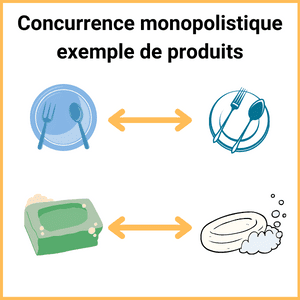What is monopolistic competition? Definition
Monopolistic competition describes a market in which companies offer products or services that are similar, but not exactly identical and cannot be perfectly substituted.
There are virtually barriers to entry and exit in a monopolistically in a monopolistically competitive industry. This means that setting up a new company or closing down an existing one is very straightforward.
None of the competitors has a monopoly, and it’s difficult for them to influence prices to increase their profits, unlike a monopoly.
Companies focus on differentiation. Companies present their offerings in such a way that they appear unique, and try to differentiate themselves in order to gain a monopoly on certain products and services, and thus be able to raise prices. The use of advertising and aggressive marketing is the norm in monopolistically competitive industries.
Examples of monopolistic competition
Monopolistic competition is commonplace in everyday life. For example, cafés, restaurants, hairdressing salons, nearby grocery stores, common products such as cutlery and household goods.

Take online betting platforms, for example. These companies offer virtually all the same betting services, since the sports matches and options on which to place bets are not infinite. However, they try to differentiate themselves from each other by marketing extremely aggressively and focusing their communications on their differences.
Why is monopolistic competition imperfect?
Monopolistic competition is not perfect because at least one of the five conditions of pure and perfect competition is not met.
In the case of monopolistic competition, product homogeneity is not respected. Each company in the industry tries to differentiate its product or service. Products and services are therefore similar but not exactly the same, making monopolistic competition imperfect.
English translation of monopolistic competition
The English translation of monopolistic competition is “concurrence monopolistique“.
